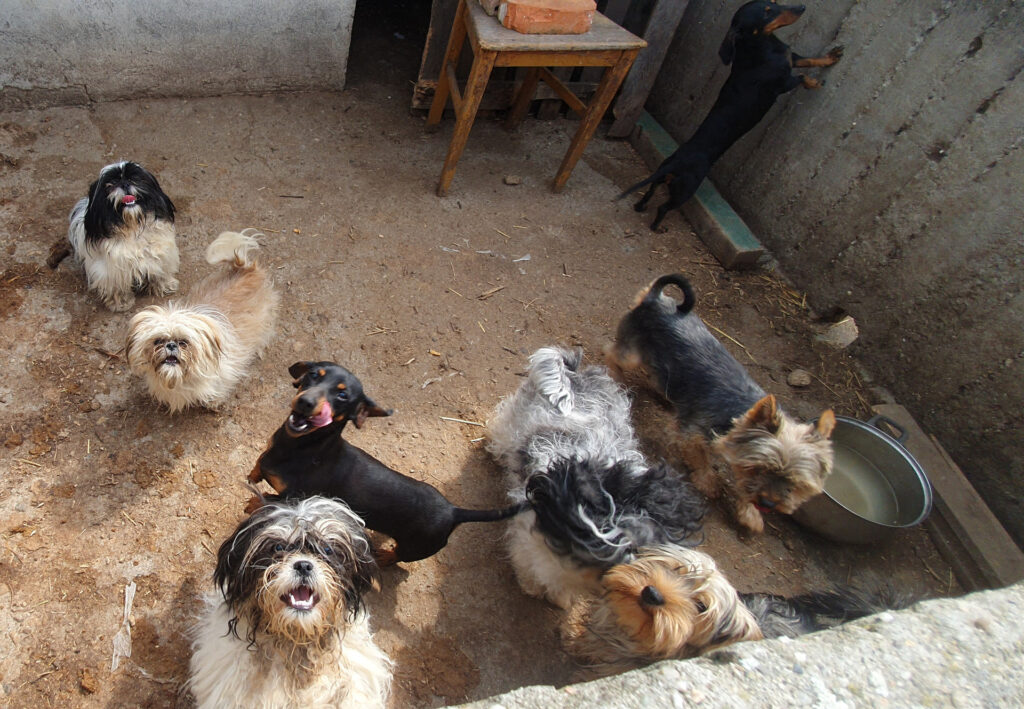Would you buy a puppy in the middle of the street — from a stranger? Most people would instinctively say no. And yet, this is exactly what’s happening every day across social media platforms, where unregulated puppy sales are fueling cruelty, neglect, and exploitation.
One heartbreaking case uncovered by FOUR PAWS shines a light on the shady practices of the online puppy trade — and why urgent action is needed to protect vulnerable animals.
Baby’s Story: A Puppy Sold in the Street
During an undercover investigation, a puppy — whom investigators named Baby — was listed for sale on Facebook as “ready to leave.” The reality behind that post was grim.
When potential buyers asked to meet Baby, the seller abruptly took her from her mother, loaded her into a car, and presented her in the middle of a street while the engine idled. For this rushed and deeply suspicious exchange, the seller demanded £1,000 in cash.
Baby’s vaccination records raised red flags, with irregularities that suggested poor or falsified medical care. She appeared shy, nervous, and withdrawn — behaviors uncharacteristic of healthy, well-socialized puppies.
After the buyers asked for a video of Baby with her mother, none was provided. Instead, the seller claimed they thought the buyers weren’t interested and quickly began advertising Baby again under a different seller profile. Within days, three new ads featuring Baby appeared online.
This revolving-door sales tactic — where puppies are treated like disposable merchandise — is a stark example of how dangerous and exploitative the online puppy trade has become.
The Bigger Problem: Social Media’s Role
Baby’s story is not an isolated incident. Across platforms like Facebook and Instagram, puppy mills and unscrupulous breeders exploit the lack of regulation to reach millions of potential buyers.
Cute photos and low prices often mask cruel realities:
- Puppies separated from their mothers far too early.
- Dogs bred in squalid, overcrowded facilities with little veterinary care.
- Falsified documents and vaccination records.
- Animals suffering from genetic disorders, malnutrition, and neglect.
Because these transactions often take place privately — in parking lots, street corners, or through direct messages — there is little accountability once the money changes hands.
Meta (the parent company of Facebook and Instagram) has the power to restrict and monitor these sales but has so far failed to take meaningful action, allowing sellers to reappear under new names as quickly as accounts are flagged.
Why This Matters
Puppies are not products. They are living, sentient beings who require proper care, socialization, and medical oversight to thrive. The online puppy trade strips them of that chance, treating them instead as quick-profit commodities.
Consumers, often unaware of the cruelty behind these transactions, end up with sick or traumatized puppies — while the cycle of suffering continues.
This issue highlights a broader pattern of abuse of animals and wildlife, where industries exploit living beings for financial gain, often under the radar of public accountability.
How You Can Help
FOUR PAWS has launched a petition demanding that Meta take stronger action to stop the sale of puppies on its platforms. By signing, you can join thousands of voices calling for accountability and change.
👉 Sign the petition here to help end the cruel online puppy trade.
Additionally, you can:
- Adopt, don’t shop: Rescue dogs from shelters or reputable rescues instead of buying online.
- Report suspicious ads: Flag suspicious animal sales on social media.
- Educate others: Share stories like Baby’s so more people understand the risks of online puppy sales.
- Support trusted organizations: Donations to groups like FOUR PAWS help sustain undercover investigations and rescue efforts.
Final Thought
Baby’s story exposes the cruelty lurking behind a Facebook post that looks innocent at first glance. She is not just a puppy caught in a shady sale — she represents countless animals exploited in the global puppy trade.
Until stronger regulations are enforced and platforms like Meta take responsibility, vulnerable animals will continue to suffer. But by speaking out, taking action, and choosing compassion, we can help shut down this cycle of abuse and ensure that every puppy is treated as what they truly are — family, not merchandise.


